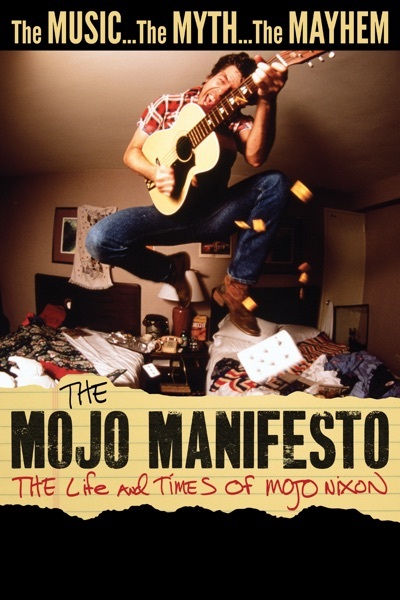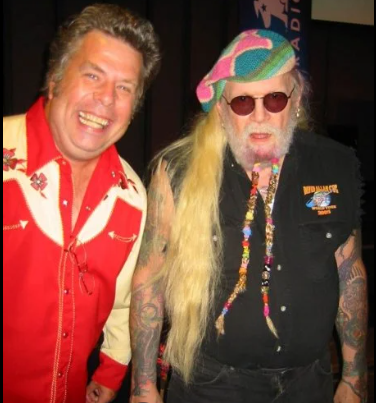
Starring: Mojo Nixon, Skid Roper, Country Dick Montana, Jello Biafra, etc.
NOW ON VOD! When I look out into your eyes out there, when I look out into your faces, you know what I see? I see a little bit of Elvis in each and every one of you out there… Take a moment and revel in the opening line of Mojo Nixon’s most famous song, Elvis is Everywhere. It took MTV by storm in 1987, when MTV was a music video channel and still culturally relevant.
Freedom Records & Films’ documentary about Mojo Nixon started production in 2012, and, at the time, it was scheduled to release a couple of years later. There’s no indication why it took so long, but the fruit of director Matt Eskey’s labors, The Mojo Manifesto: The Life and Times of Mojo Nixon, is well worth the long wait.
Maybe you don’t know Mojo… that’s been a long time. If that’s the case, then here’s your Mojo Moment of revelation. MTV in the post-punk days was a crazed cauldron of New Wave, early electronic music, and bubblegum pop, which all blended into the beauty of Darkwave and some other musical genre spin-offs. One of the more intense styles to emerge was called Psychobilly, a noisy fusion of roots blues, country, and rock with a punk edge. Punk plus Rockabilly is Psychobilly.

“…Mojo Nixon: a primitive blues-inspired musician. Adding pure hyperactive insanity and extemporaneous rants to his songs…”
Nobody was more psycho or hillbilly-punk than wild-eyed, carnival-barker-talking Mojo Nixon. His music is unfiltered Americana satire. After Elvis is Everywhere, he had a semi-hit with the controversial Debbie Gibson is Pregnant with My Two-Headed Love Child, which didn’t do as well after MTV refused to air it. His legend grew, however, with a shout-out in The Dead Milkmen’s hit Punk Rock Girl. He continued through many albums with irreverent, satirical cultural commentary in Don Henley Must Die, Stuffin’ Martha’s Muffin, Are you Drinkin’ with me Jesus? and more. Typically his songs include a long unstructured bridge where Mojo indulges in hillbilly freestyle rants. This is where he shines.
The film introduces young Neill Kirby McMillan Jr. growing up in Danville, VA, under the influence of music from his father’s soul radio station. While on a bicycle trip across the U.S., partying in New Orleans, he has an epiphany he refers to as “The Mojo Revelation.” It leads the young man to his stage persona as Mojo Nixon: a primitive blues-inspired musician. Adding pure hyperactive insanity and extemporaneous rants to his songs, he sets off for the wilderness to perform his wild music.
Eskey tracks Mojo teaming up with instrumentalist Skid Roper, usually seen playing a washboard, and they go on to perform anywhere that will have them. They land a record deal, get college radio airplay, and then get famous during the glory days of MTV. During his long career, Mojo is shown in moments with Indie music luminaries. When his time with Skid Roper was done, he hung out with Jello Biafra and Country Dick Montana.
“…Nobody was more psycho or hillbilly-punk than wild-eyed,
carnival-barker-talking Mojo Nixon”
He formed a new band at one point called the Toadliquors, and the fun never stopped. Even the end credits of the film are pure joy, as we appreciate the song Are you Drinkin’ with me Jesus alongside a slideshow of great Mojo friends and times. There is something gloriously wrong with him, to be sure. It’s depressing to imagine how much beautiful art and frenzied fun we’d have missed if Mojo had ever been properly medicated.
I met Mojo, decades ago, before a show in Atlanta’s old Cotton Club. We were early and he was sitting at the bar. I heard of him from a college friend in West Virginia, who played a track from an Enigma records collection of new artists. The song was Amsterdam Dogshit Blues (that’s what it’s about). I said hello and we chatted for a moment. He asked where we were from. When I told him about Tom from West Liberty college, he signed a napkin for us, writing: “Tom, you f**king hillbilly, Mojo.”
All these years later, he’s still Mojo-ing it up on a Sirius XM radio show called Outlaw Country, with the same bombastic energy he’s always had, and the world is better for it. His brand of crazy is a pure, wild-at-heart, sincere love of American freedom and disregard for rules. His punk rock sensibility isn’t an act: he is exactly what he appears to be. In a cynical world, he’s the real deal. Mojo is to music what Howard Finster is to painting: an unrepentant outsider artist making music for the masses.
Love of Mojo is something one fears is an isolated fandom. So many years have passed, and his MTV fame went by so fast. Eskey brings it all roaring back: The Dead Milkmen, MTV when it was good, growing up watching 120 Minutes, and so many cultural touchstones from the ’80s and early ’90s. This is not a celebration you can share with anyone who wasn’t there… it was a potent mix of elements, and being a certain age at a certain time was a key ingredient. Every generation has its moment. We had the Mojo Revelation. You can relive yours in this joyous documentary. The Mojo Manifesto: The Life and Times of Mojo Nixon is a riot, especially for fans, or a good primer for those who don’t know him. Good fun in hard times.
Mojo brings us to Elvis and Elvis to Mojo. We are all moving in perfect peace and harmony towards Elvisness. Soon all will become Elvis. Thank you, Matt Eskey!
The Mojo Manifesto: The Life and Times of Mojo Nixon was scheduled to screen at the 2020 SXSW Film Festival.